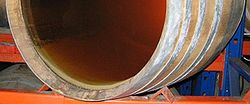trouble with clearring


Natural clarification takes place as wine ages in barrel, its suspended particles gradually falling to the bottom.
In
wine tasting, a wine is considered "
clear" when there are no visible particles suspended in the liquid and, especially in the case of white wines, when there is some degree of
transparency. A wine with too much suspended matter will appear cloudy and dull, even if its aroma and flavor are unaffected; wines therefore generally undergo some kind of clarification
Before
fermentation,
pectin-splitting
enzymes and, for white wine, fining agents such as
bentonite may be added to the
must in order to promote the
agglomeration and settling of
colloids later.
[Pectins are structural molecules in the cell walls of fruits which have the important function of 'gumming' plant cells together. The pectin content of grapes increases steadily throughout ripening, reaching levels of about 1 g/l, although it varies by varietal and pre-fermentation handling processes. Large pectin molecules can affect the amount of juice yielded at pressing, ease of filtration and clarification, and extraction of tannins. Grapes contain natural pectolytic enzymes responsible for softening the grape berries during ripeneing, but these are not active under wine-making conditions (due to pH level, SO2, and alcohol.) Therefore, fungal pectolytic enzymes are often added to white must to break up pectins, decrease the viscosity of the juice, and speed up settling. In red musts, this increases colour and tannin extraction.
After fermentation, the force of
gravity may eventually cause the wine to "fall bright" or clarify naturally, as the larger suspended particles gradually settle to the bottom of the
storage vessel. The wine can then be
siphoned or "
racked" off the compact solids into a new container.
] But this process may take many months, or even years, as well as several rackings, in order to produce a perfectly clear wine. Producers can accelerate the process by using fining agents, filtration and/or flotation.

there are always other considerations to take into account, but pectin haze in highly concentrate kits(whites) sometimes don't fit the standard approach.








 there are always other considerations to take into account, but pectin haze in highly concentrate kits(whites) sometimes don't fit the standard approach.
there are always other considerations to take into account, but pectin haze in highly concentrate kits(whites) sometimes don't fit the standard approach.